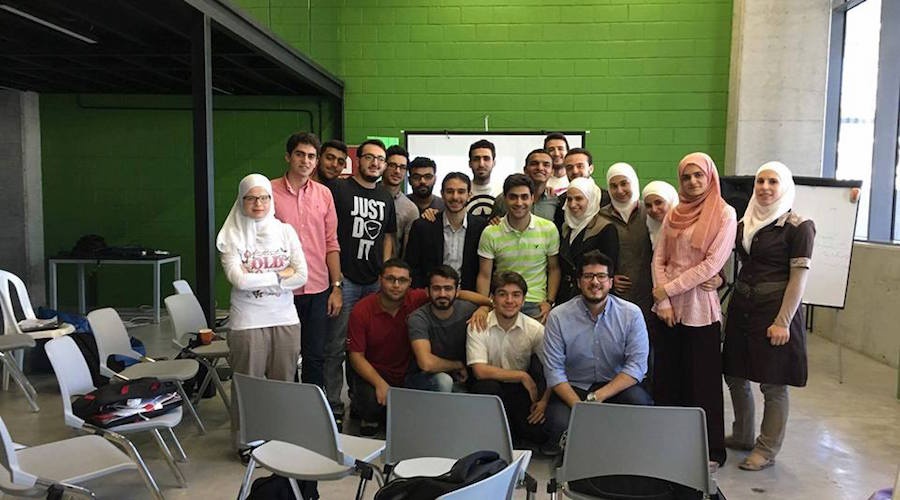Artificial intelligence startup wins at Jusoor competition

Arabot, a startup that uses artificial intelligence to build online Arabic chatbots, won first place at Jusoor’s third annual Entrepreneurship Bootcamp competition.
“We want to build the first intelligent Arabic chatbot to help brands in the Arab world better serve their customers, answer digital queries more efficiently, as well as gather information on their customers’ preferences and demographics,” said cofounder of Arabot, Iyad Alshami.
The bootcamp was an intensive volunteer-run training program that hosted 10 Syrian startups in Beirut for a duration of 15 days. Trainings were conducted at Beirut Digital District (BDD).
Volunteer mentors included Ahmad Sufian Bayram, coordinator of the Jusoor program and regional manager of Techstars, Karim Samakie, cofounder of Sajilni, Hassane Slaibi, cofounder of Roadie Tuner and Mohammed Midani, founder of Hoppay. Several entrepreneurs and speakers from the local ecosystem also volunteered their time to give workshops and presentations.
“The [entrepreneurs] were pretty awesome to talk to. They have amazing skills in coding, game development and other areas,” said Slaibi.
The Arabot platform used a branch of machine learning called deep learning, and an artificial network called LSTM to build the intelligent chatbot. The latter is capable of learning the grammatical structure of the Arabic language and differentiate between different dialects, according to Alshami.
While aware of global competitors like api.ai and wit.ai, Alshami and his cofounder hope that their use of AI will give them a competitive edge.

“We will be ready to launch in three months,” said Alshami. “We already have one partnership with Marj3 secured, and are in talks of other partnerships.”
The remaining teams
Based in Egypt, Marj3 supports students applying for scholarships by partnering with universities and organizing online and offline workshops.
Active for over a year, the team has helped more than 10,000 students across four countries.
“We have partnered with 10 universities in Turkey, three in Cyprus and almost all of Egypt’s universities, around 50 in total,” said cofounder Sami Al-Ahmad.
Marj3 was officially launched in July this year. Previously, the cofounders organized similar platforms such as Khatwa. Khatwa is network that supports Syrian youth in Egypt looking to enroll in higher education.
In a heartwarming effort to support the winning team, Marj3 will be the first startup to implement Arabot’s chatbot.
“Our work relies a lot on online responses to our audience. AraBot will definitely be a step forward for us,” Al-Ahmad added.
Refuact:
Refuact equips users looking to launch programs and initiatives benefiting refugees with the adequate skills and connects them to a network of volunteers. They plan to launch in Lebanon’s northern Bekaa’ region soon.
Glean
Possibly a global rarity, Glean is a solar-powered washing machine that recycles water. It was developed by solar scientist Yaman Abou Jaib, also partner of the solar company AFREE in Damascus.
“Glean saves 30 percent of water energy and has three uses: in industrial companies, hospitals and residential units. I was able to replace the electric water heater with a thermal system that saves energy,” said Abou Jaib.
Abou Jaib was the winner of the 7th season of Qatar’s Stars of Science show, and made it to MIT’s list of 35 innovators under 35.
Virtual Palmyra
Virtual Palmyra is a mobile app that uses AR and AI to educate users on the history, name and source of architectural ruins in Syria.
“We want buildings and monuments to be able to tell their own stories. Users simply take the picture of the site and the app will use an artificial intelligence system to recognize the subject, and extract its history from a database,” said cofounder Nojoud Al Jallad.
She plans to partner with museums in Syria to develop her database and business model.
This virtual reality gaming startup designs games customized to the user’s request. “We want to offer [users] the experiences they can’t have in real life through our games,” said cofounder Fady Ashy. His startup is now being incubated at ICT incubator.

Clerk
Clerk is a human resources algorithm that filters applicants for a given job according to their skills and personalities. “We already have a working prototype, and the Arab International University is an early adopter of our platform,” said cofounder Massa Baali, former intern at Microsoft Research Lab. Clerk made it to the semifinals of GIST 2016 and MIT global bootcamp in 2016.
3alemni
3alemni is social startup that helps homeless or working Syrian children reintegrate into school life through specialized psychosocial support. Based in Turkey, they have already worked with 10 children and secured the fees of their tuition.
“Only six of these children were able to re-adapt to school,” said cofounder Malak Kaddeh. “Our psychosocial model is still in its baby steps, and finding experts is difficult.”
Fikel el Kheir
This platform connects volunteers to NGOs and allows volunteers to choose activities they prefer. “We plan to make money through a freemium and premium subscription model,” said Aalaa Al Hamwi.
They already launched and have three NGOs on board. “We have about 120 NGOs in Syria because of the crises, so we have a good market,” she added.
Sigmund
Sigmund is a data tool that helps platforms aggregate data on their users through social media. Data collected includes search preferences and demographics.
The event was live streamed on Jusoor’s Facebook account.


